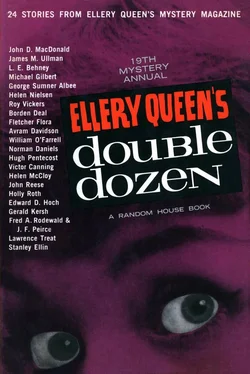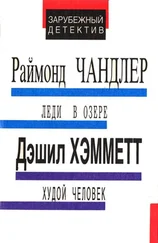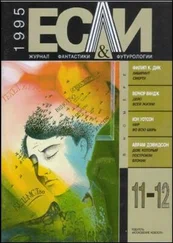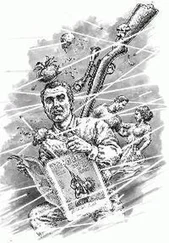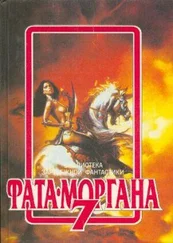“He’s not out at his camp. He made a try for me and kept right on going,” disagreed Warren. “He doesn’t want the Volkswagen any longer; he knows I’ll wire the police to look for it. No, he’s walking, Ahmed. If sunstroke doesn’t get him, or sand vipers, he’ll walk until he catches a ride on a truck — or on a dromedary. And meanwhile he’ll go on ordering killings because I didn’t crack his communications system!”
“The killings are continuing, it is true. While you were in the bath, we heard on the radio that piedsnoirs broke into a hospital and murdered eight patients in their beds.”
“Oh, I’m a great all-round success,” said Warren bitterly. “What time is it?”
“Five in the afternoon.”
“Saddle up. We’ll have a look at the camp. Maybe in his hurry he’s left something behind.”
“Take your automatic, my son. I will take the old revolver I used in the maquis in the Second World War.”
The camp was deserted. The campfire smoldered. Warren knelt beside it “What’s that I smell?”
“Skin,” replied Ahmed. “Leather.”
Warren raked the embers with a stick. “Here’s a piece. Why would he destroy something made of leather, I wonder. A code book, maybe.”
“Only Allah knows.”
Warren sighed. “Anyhow, you own a Volkswagen. I’ll drive it back to town for you; I have to send my wire to Chardin in Algiers.”
“As you wish.” Ahmed spat into the embers. “I’ll ride Dusk. The mare follows well.”
The dusk for which the dapple-gray stallion was named descended on the North Sahara like a snowfall of gray powder. Stars winked on, and, below them, gasoline and carbide lanterns. His telegram to Chardin on its way, Warren left the Volkswagen parked beside the post office and handed over the keys to Ahmed.
“Don’t censure yourself too severely,” said the older man. “When you are as old as I, you will know life is just one error after another. We think we think; but that, also, is an error more often then not.”
“I need a drink worse than I need food,” responded Warren glumly. “Let’s go to the café. I’ll buy you an anisette.”
“First I will lock my new automobile to discourage thieves,” said Ahmed. “Take Dusk — I’ll be along in a moment.”
The brightly lighted cafe was full of men who crowded round to offer their sympathy. Herwarts had attacked him because they’d had a quarrel, Warren told them, but he doubted very much if they believed the story. He ordered drinks for the house. After a few minutes Ahmed appeared, sending home the horses in care of a small, delighted youngster.
“What will you do now?” asked Ahmed.
“There isn’t much I can do,” replied Warren realistically. “He knows me. There’s no point in my following him, even if I knew where to look.”
“You don’t think he might still be nearby? We could mount a search party.”
“We’d never find him at night. And night is when he’ll travel. No, I’ll go back to Algiers and ask to be reassigned. I’ve blown this one, that’s all.”
The owner of the portable restaurant came in from the street waving smoking lamb chops, and they bought a plateful from him. In a corner, a trio of musicians spread mats on the floor and began to play — two flautists and a drummer with a set of small, thin drums not unlike tambourines. The music rippled like water, the ceaseless dream of every desert dweller.
Ahmed patted Warren’s hand as though he were a small boy. “If you came of a race as old as mine,” he said comfortingly, “you would know that the one thing man can count on is man’s stupidity. Herwarts, too, will do something stupid, attend to my words.”
“Not Herwarts. No such luck.”
Smiling mischievously, the Arab stroked his black beard. “Would you care to wager your magnificent automatic,” he inquired, “against my poor old black-powder pistol?”
“You’ve got yourself a bet, Great-Uncle.”
“My bet,” said Ahmed, “is that Comrade Herwarts is still in Bou Zanna. As you have pointed out, the intelligent thing for him to do was to run. Therefore he is still here. Why? Because he is in panic, and panicky men are even stupider than the rest of us.”
“Get together your search party!” exclaimed Warren. He leaped to his feet. “Let’s go.”
“There is no need,” murmured Ahmed, gently waving him down. “He will deliver himself to us, believe me. It is all arranged. Another anisette?”
“Ahmed, you realize how important this is. If—”
“Tranquilize thyself.”
The music changed. The rhythm became staccato, the flutes quickened their pace, and Warren felt his pulse respond. “Wah’-shah’lah, get hot,” someone cried. Several of the younger men, stretching arms in simulation of the long flintlocks their great-grandfathers had carried into war, formed a ring and whirled into a crouching, hopping dance. The drummer waved a small drum high over his head, his fingers tapping it so fast they became a blur.
“The best jazz drummer in the United States couldn’t do that,” marveled Warren. “He’s syncopating the beats, too. Why, it’s impossible!”
“He smokes hemp to heighten his sense of rhythm,” said Ahmed. “They all do. They tighten the leather of the drum over a fire.”
“The leather—” Warren frowned into his drink. He looked up. “The piece of leather we found in Herwarts’ campfire was what was left of a drum, Ahmed. Now I know how Hewarts sends his messages. He taps them out on a drum in ordinary Continental code, at high speed, as an accompaniment to the instrumental music he records. Dubbing, recording engineers call it. All that his accomplice in Algiers has to do is play back the tape at low speed, decode, and reseal the package. The accomplice is somebody living in the pension on the Rue de Joinville.”
“Technology,” said Ahmed, “is beyond my poor understanding. Nevertheless, I must congratulate you.”
“I must phone—”
From somewhere not too far off came the crash of an explosion.
“Ahmed—” began Warren sternly.
“I found your detonators when I forced your suitcase,” confessed Ahmed, with a little shrug of apology. “They led me to examine your red and green cough drops. We used something similar in the Second World War, although our explosive was more like a jelly. I felt sure Comrade Herwarts would try after all to escape in his Volkswagen, parked so conveniently, so I left the keys in it for him.”
Warren shook his head. “You’ve lost an automobile, Great-Uncle,” he said.
“And a post office too, I rather imagine,” replied Ahmed, deadpan. “But, on the other hand, I have just won a superb automatic with a silencer, which will be something far more useful to me in my small affairs.”
Helen Nielsen
Death Scene
Leo was a cool, calculating opportunist. He was also a handsome devil, with nerve and vitality... all of which make a dangerous combination for a lonely and susceptible woman...
* * *
The woman who had driven in with the black Duesenberg fascinated Leo Manfred. She stood well, as if she might be a model or a dancer. Her ankles were arched and her calves firm. Leo wriggled out from under the car he was working on in order to examine her more closely.
She was dressed all in white — white hat with a wide, schoolgirl brim; white dress, fitted enough to make her body beckon him further; white shoes with high, spiked heels.
But it was more than the way she dressed and the way she stood. There was something strange about her, almost mysterious, and mystery didn’t go well in the grease-and-grime society of Wagner’s Garage. Leo got to his feet.
Читать дальше
